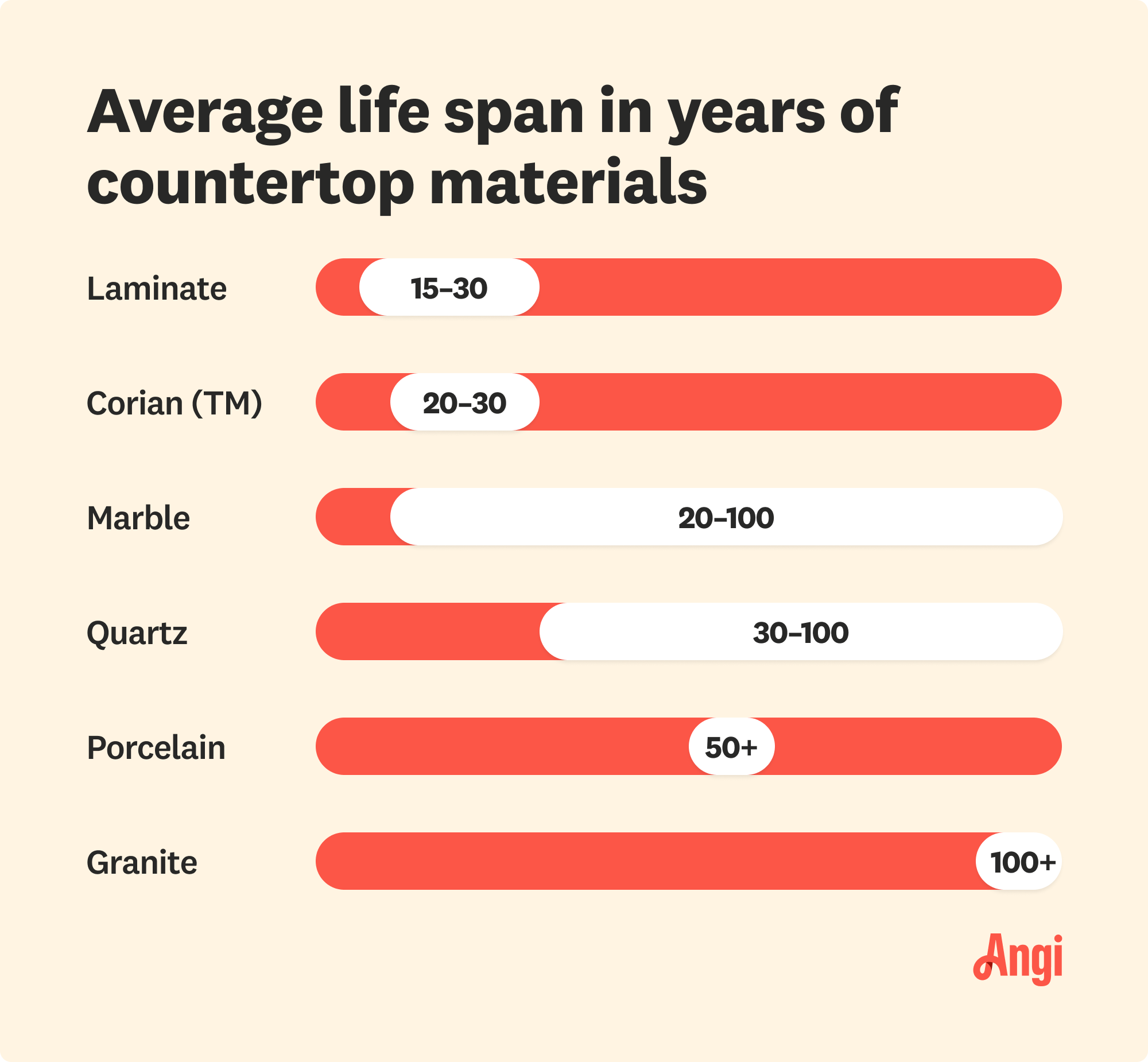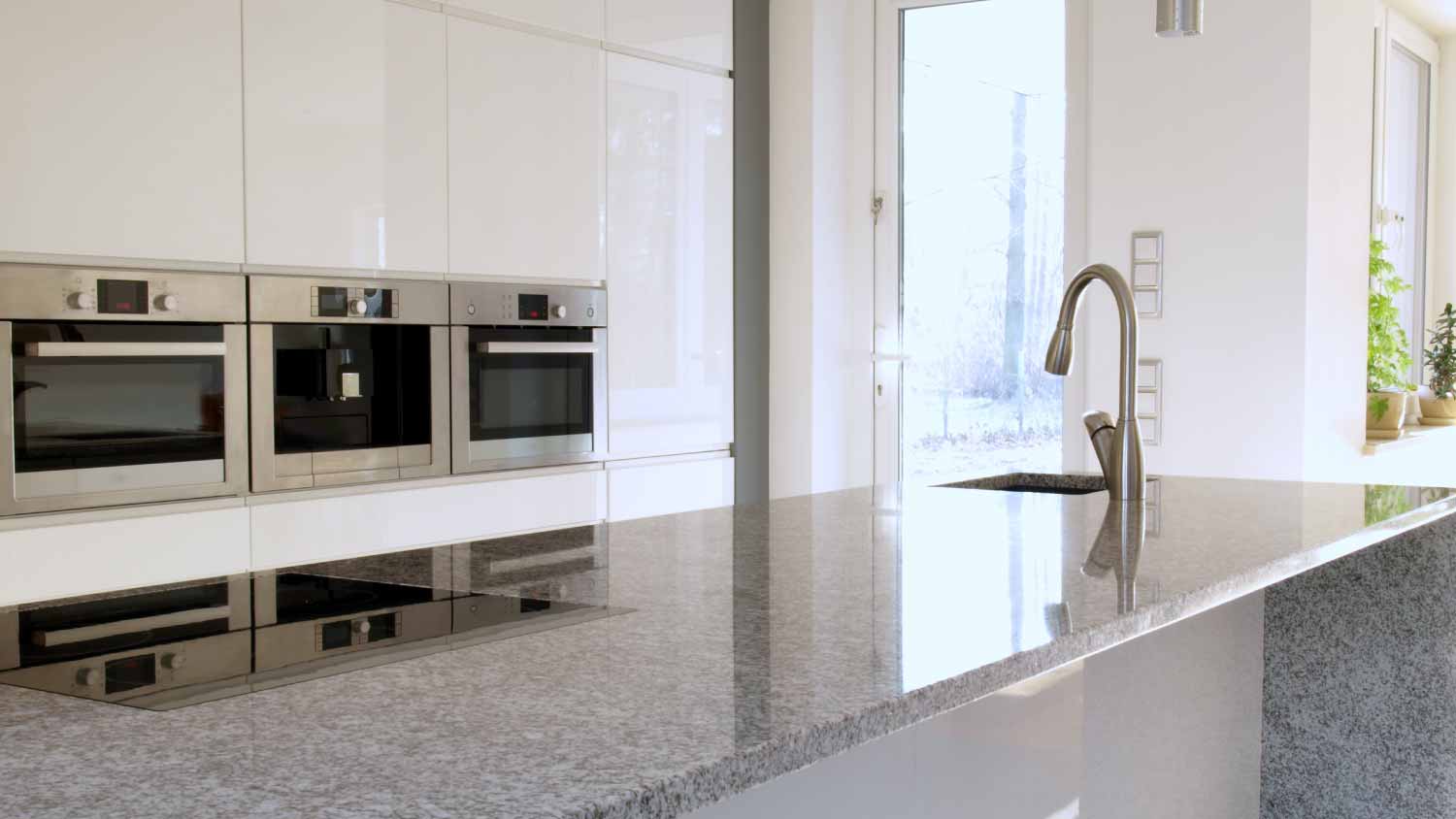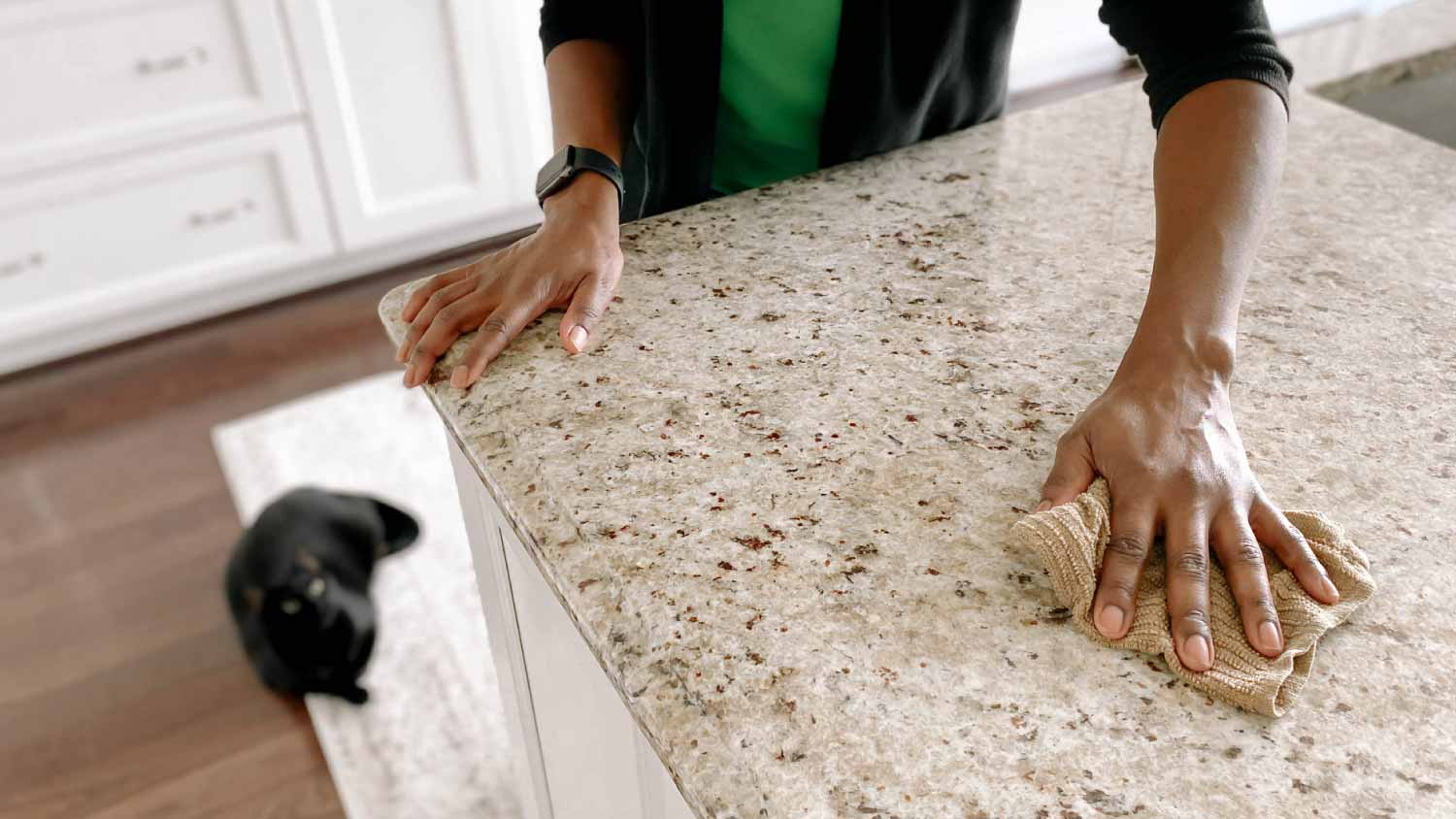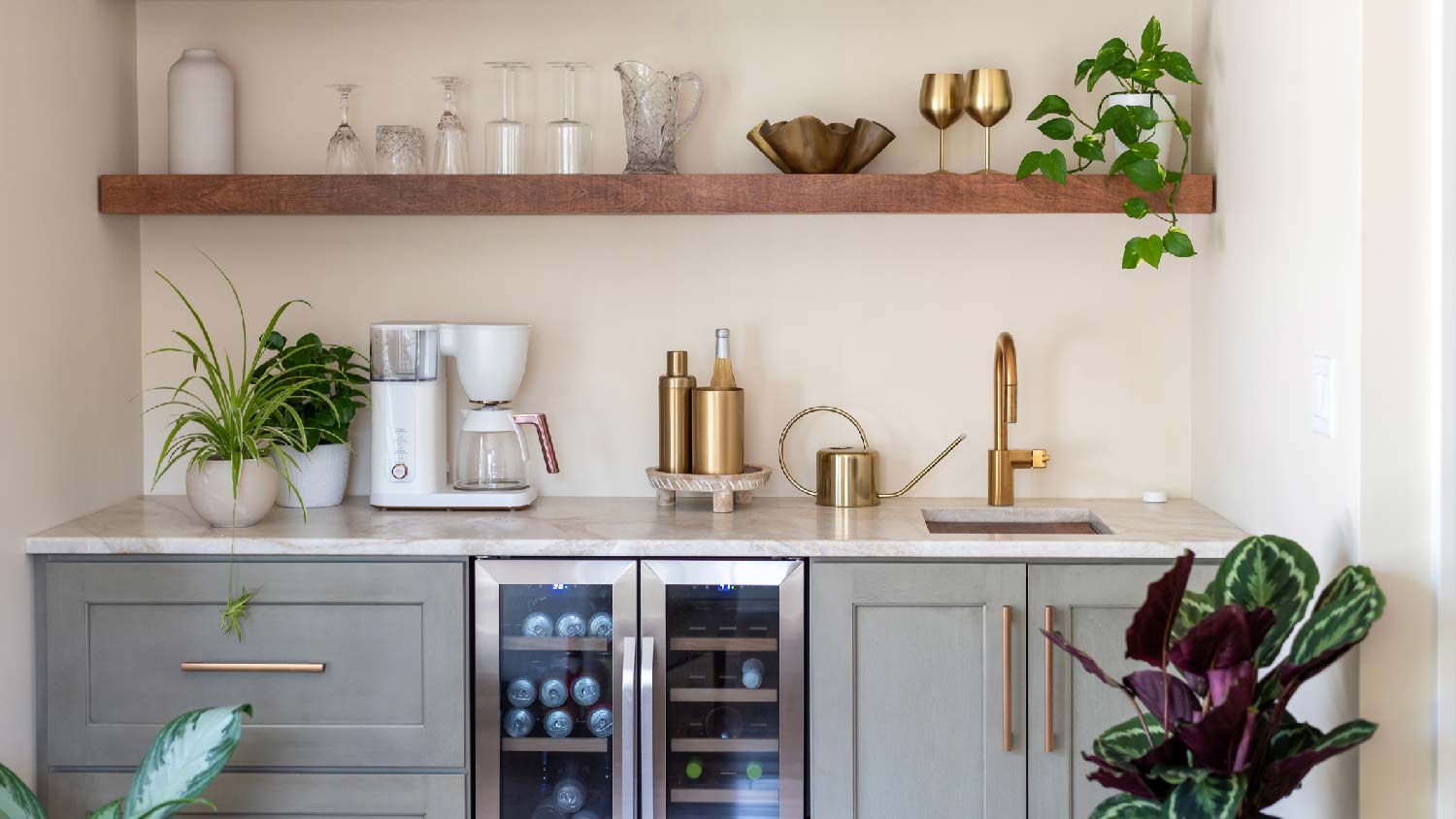How Long Do Granite Countertops Last?
Granite can last a lifetime with proper care


Granite countertops are known for their durability, but even this resilient stone wears down and needs to be replaced over time. We’ll explain how long granite countertops usually last based on several key factors and offer tips for extending their lifespan.
How Long Do Granite Countertops Last on Average?

Granite countertops can last over 100 years if correctly installed and impeccably maintained, but that longevity is rare. Even the best-maintained granite countertop will lose its luster from standard kitchen use before reaching the century mark. Instead, the average granite countertop must be replaced every 15 to 25 years. That’s still a longer lifespan than most countertop materials, including laminate, wood, and epoxy, making granite a top choice for homeowners interested in durability.
Factors That Influence How Long Granite Countertops Last

Many small, everyday details affect whether a granite countertop lasts for a couple of decades or a lifetime. Below are the most important factors to keep in mind.
Installation
The first step in long-lasting granite countertops is proper installation. Improper installation can cause issues like chipping and cracking, as well as an unpleasant aesthetic with mismatched or raised seams. We recommend hiring a local granite countertop pro for installation since it’s a difficult DIY task that involves moving heavy slabs.
Usage
Granite countertops are used daily in high-traffic areas like kitchens and bathrooms. Like all types of stone countertops, with more use, they receive more wear. However, you can combat wear and tear by using cutting boards and keeping hot pans off the countertop.
Cleaning
Regularly cleaning granite countertops is a surefire way to increase their lifespan. It prevents staining and fading, protects the sealant, and removes dirt and bacteria. However, certain chemicals can cause etching on your stone countertops. Be sure to use a granite-safe cleaner.
Sealing
Granite countertops should be sealed upon installation, and you must reseal them at least once every year. Sealant protects the material from scratches, high temperatures, and stain-causing liquids. Not resealing your granite countertops will definitely shorten their lifespan and leave you with a lackluster, porous surface that can hold onto bacteria.
Accidents
Accidents are bound to happen, especially in busy rooms like the kitchen. Even though granite is harder and more durable than most countertop materials, dropping a heavy pan on it or cutting the surface with a knife can cause a chip, crack, or scratch.
How to Increase the Lifespan of Granite Countertops

Homeowners can add years to the lifespan of their granite countertops with proper maintenance. These simple tips and tricks make a big difference:
Clean granite countertops with a damp cloth and mild disinfectant every day.
Immediately wipe up spills from acidic liquids like lemon juice, vinegar, and wine.
Reseal granite countertops every 12 to 18 months.
Use cutting boards during food preparation.
Don’t place hot pots or pans on the surface unless you use a countertop protector.
Three Signs It’s Time to Replace a Granite Countertop
After years of use, there inevitably comes a day when your beloved granite countertop needs replacement. Here are the telltale signs it’s time for a revamp.
Physical damage: The surface has visible chips or scratches, especially if they make the countertop difficult to use and clean.
Aesthetic preferences: Styles change over time, and the countertops you installed 20 years ago might not align with the kitchen look you want today.
Moving out: When selling a house, it’s common to install new countertops to increase the property’s resale value.
When replacing countertops for an aesthetic change rather than due to damage or wear, consider these granite alternatives:
Soapstone countertops cost between $2,100 and $7,200
Marble countertops cost an average of $2,000 to $5,000
Travertine countertops cost $600 to $3,200
Should I Restore or Replace My Granite Countertop?
All hope is not lost if your granite countertop shows signs of deterioration. It’s possible to restore the existing granite instead of replacing it. Common restoration tactics include polishing or resealing the surface and filling cracks and holes with epoxy. Extensive repairs might require professional granite restoration, but that’s cheaper than the cost to install new granite counters.
Frequently Asked Questions
Installing most granite countertops costs between $2,000 and $4,000, with an average price of $3,250. A more precise way to gauge countertop installation cost is by square footage; typical granite slabs cost $40 to $60 per square foot. Granite is slightly more expensive than the average countertop option but has a wider price range than most, so it’s often possible to find various options to suit your budget.
Quartz and granite are two of the most popular countertop materials. The best option depends on your budget, aesthetic preferences, and the amount of maintenance you prefer. Quartz is more expensive than granite but slightly more durable and requires less maintenance. Granite is cheaper to install and repair and is durable in its own right, but it requires more upkeep. Since granite is a natural material, it tends to have a more sophisticated and stylish look than engineered quartz.
While no countertop material is truly “heatproof,” granite countertops are extremely resistant to high temperatures. Some types of granite can withstand temperatures up to 1,200 degrees Fahrenheit. However, we don’t recommend placing hot pots and pans directly on granite countertops. Even if it doesn’t scar the granite, it may damage the sealant.





- How to Seal Granite Countertops: A Complete Guide
- How to Change the Color of Your Granite Countertops for a Brighter Kitchen
- How to Choose Between Epoxy vs. Granite Countertops: Everything You Should Consider
- Sink Your Teeth Into Granite Sink Cutouts
- What Are Granite Remnants?
- How To Paint Countertops: A Step-by-Step Guide
- How to Cut Countertops for a DIY Kitchen Reno
- 9 Low-Maintenance Countertops to Make Your Kitchen Shine
- Laminate Countertop Pros and Cons
- Do Quartz Countertops Need to Be Sealed? Find Out the Answer

 - Derek Rose.png?impolicy=thumbnail)








